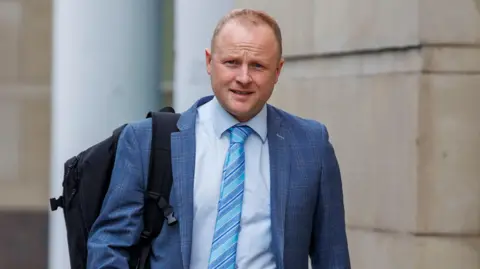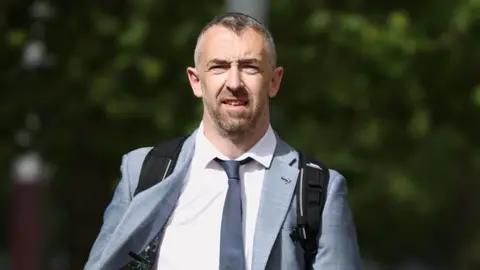No verdict yet in Bryson and McKay case
 PA Media
PA MediaVerdicts are expected within the next three weeks in the court case involving loyalist activist Jamie Bryson and former Sinn Féin politician Daithí McKay.
At the end of a four-week trial, Judge Gordon Kerr KC reserved judgement but said he hoped to deliver verdicts before the end of the legal term at the start of July.
The Crown's case is that there was an attempt to subvert the rules of a Stormont committee in 2015.
Mr McKay was chair of the finance committee at the time, while Mr Bryson gave evidence. They both deny the charges against them.
After closing submissions in the non-jury trial, the judge said he would give at least four days' notice before delivering his verdicts.
The case dates back almost 10 years to a committee meeting held at Stormont on 23 September 2015.
At the hearing, Mr Bryson spoke about how Northern Ireland property loans were handled by the National Asset Management Agency, known as Nama.
He made an allegation about the then leader of the Democratic Unionist Party (DUP) Peter Robinson, which was later denied and described by the politician as "scurrilous".
Mr Bryson, 35, from Rosepark, Donaghadee denies a charge of conspiracy to commit misconduct in public office in September 2015.
Mr McKay, 43, from Loughan Road, Dunnamanagh, denies a charge of misconduct in public office.
The prosecution said Mr Bryson and Mr McKay were involved in an attempt to subvert the rules of the committee in order to cause "considerable political embarrassment" to a number of people including Mr Robinson.
 PA Media
PA MediaAt the centre of the case are screenshots of private messages said to have been exchanged on Twitter between Mr Bryson and Mr McKay before the committee meeting in question in 2015.
News of their existence emerged almost a year later when the Irish News published a story in August 2016 claiming that Sinn Féin had "coached" Mr Bryson before the committee hearing.
Another man, who was a Sinn Féin member at the time, is also on trial.
Thomas O'Hara, 41, from Lisnahunshin Road, Cullybackey, denies a charge of conspiracy to commit misconduct in public office.
The Crown alleges he, like Mr McKay, was involved in an exchange of messages with Mr Bryson in the run up to the committee meeting.
During the trial, Mr Bryson admitted sending a series of private messages to the accounts of Mr McKay and Mr O'Hara but insisted he did not break any laws.
Mr O'Hara insisted he was simply a conduit between Mr McKay and Mr Bryson, copying and pasting messages from one to the other.
Giving evidence, Mr O'Hara told the court he has dyslexia and left school at 16 with no qualifications. He insisted he did not understand the messages that he passed on.
During closing submissions in the case, prosecution barrister Toby Hedworth KC said it was accepted that Mr O'Hara has "intellectual limitations" but insisted he would have understood the "gist" of what was happening.
Mr O'Hara's barrister, Des Fahy KC, rejected this, and said his client had been "taken advantage of" at the time.
Mr Bryson's barrister, John Larkin KC, said there was no evidence of any agreement between his client and Mr McKay, and therefore no evidence of criminal activity.
Martin O'Rourke KC, the barrister acting for Mr McKay, said the court should not be intervening in a parliamentary process.
Earlier in the trial, when Mr Bryson gave evidence, he said he was not aware that Mr O'Hara had been acting as an alleged "back channel" to Mr McKay.
Although the trial lasted four weeks, much of it was taken up with legal arguments.
